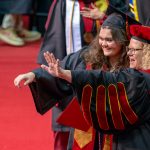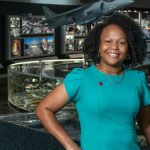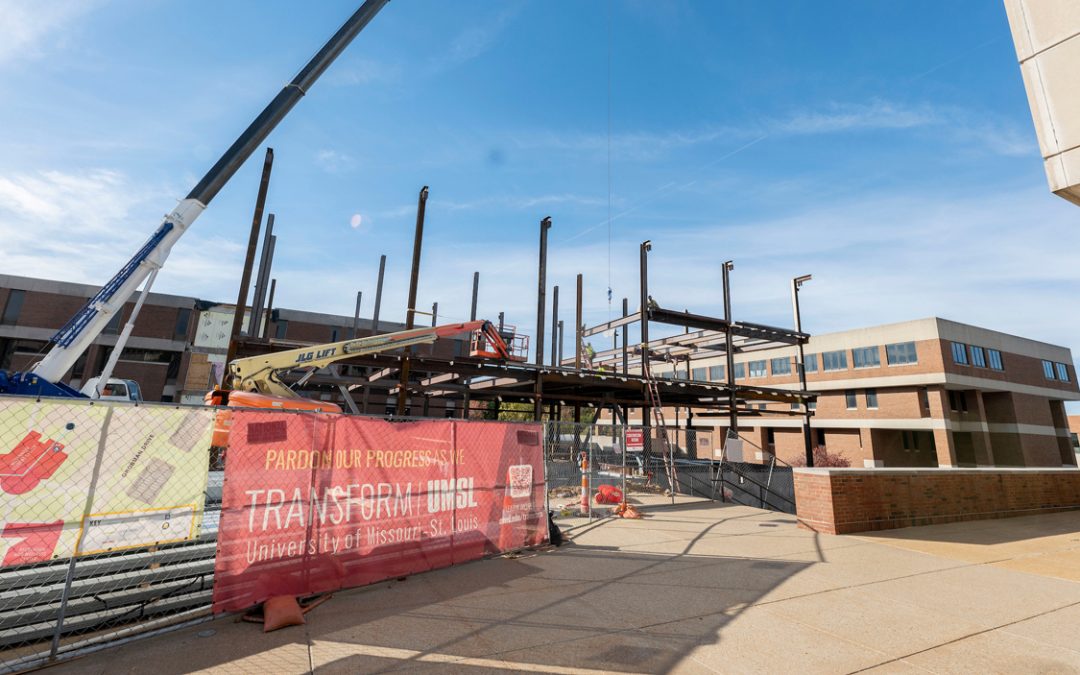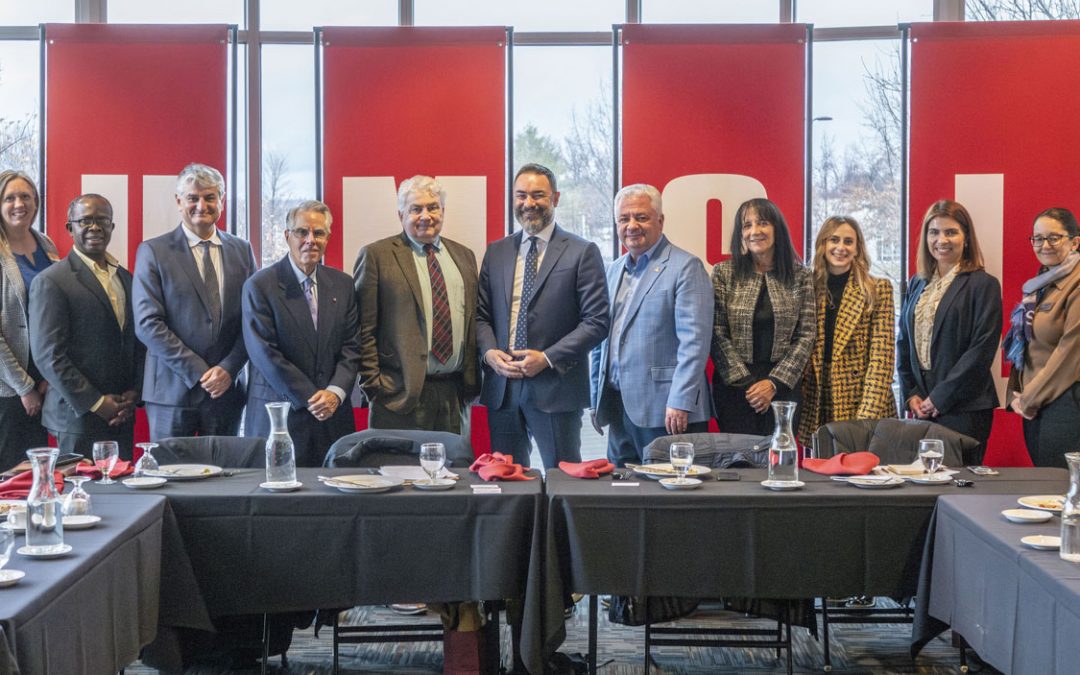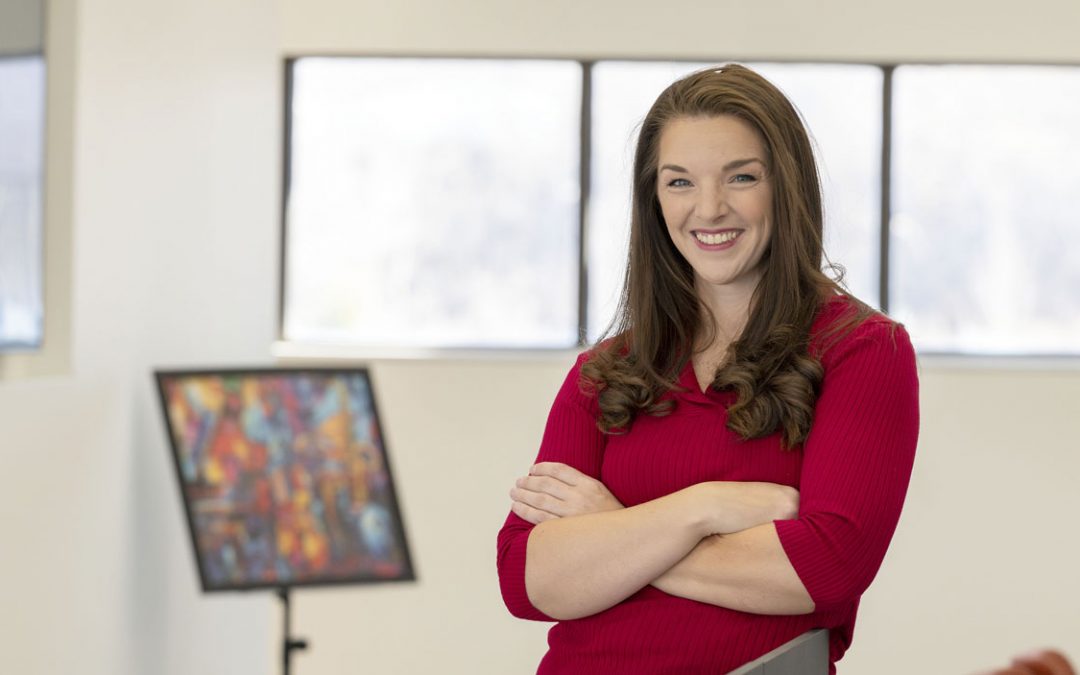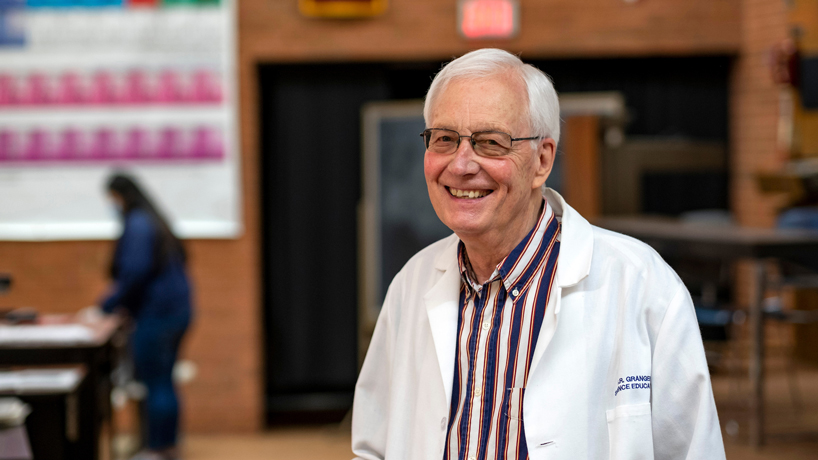
Charles Granger came to UMSL in 1971 as an assistant professor of biology and education and now serves as a Curators’ Distinguished Teaching Professor of biology and education. For six decades, he has dedicated himself to the advancement of science education, serving as an educator, mentor and researcher. In recognition of his contributions to science education in the state, the Science Teachers of Missouri created the Charles R. Granger Legacy Award in 2021. (Photo by August Jennewein)
As a farm boy in the 1960s, Charles Granger enrolled at Iowa State University to study engineering – even though he wasn’t quite sure what it entailed.
“I didn’t know exactly what engineering was to be honest,” he said with a laugh. “I was interested in chemistry in high school, and I had a buddy that was interested in aeronautical planes and another one, who had more sense than the both of us, was interested in agriculture. So, we all went to Iowa State.”
However, the professors in Granger’s introductory botany and zoology courses inspired him and nurtured an interest in biology he had developed on the farm. Their guidance motivated him to pursue science education.
For the next six decades, Granger dedicated himself to the advancement of science education, serving as a science educator, mentor and researcher; publishing numerous academic papers; and leading dozens of professional and youth science programs.
The majority of that time has been spent at the University of Missouri–St. Louis. Granger came to the university in 1971 as an assistant professor of biology and education and now serves as a Curators’ Distinguished Teaching Professor of biology and education.
In recognition of his contributions to science education in the state, the Science Teachers of Missouri created the Charles R. Granger Legacy Award in 2021. Granger was the inaugural recipient this past fall, and the annual award will continue to honor educators who have spent their careers striving to give back to Missouri’s science community.
Elizabeth Petersen, awards chair of STOM and STEM facilitator for the mySci Curriculum program at Washington University in St. Louis, has known Granger since she was undergraduate at UMSL. The idea for the award came last year as Petersen was helping plan Granger’s 50th UMSL anniversary celebration, which will take place in May.
She brought the suggestion to her committee, and it was met with unanimous support.
“He is truly in a league of his own, and I thought, ‘What a great idea to create a new award named after him and to be able to honor him as the first honoree,’” Petersen said.
Despite a laundry list of credentials, Granger remains modest about the award.
“It’s quite an honor,” he said. “There are so many other people that are worthy of such an award and recognition, so many tremendous teachers out there that don’t get rewarded and don’t get recognized.”
Granger’s path to becoming a teacher began with two moments as a student at ISU.
An academic advisor mentioned that there was a part-time job teaching science at a local Lutheran children’s home in Ames, Iowa. Granger decided to take the position and brought some materials and equipment from the university to the home. The experience made a lasting impression.
“They got so excited, and I got excited about their excitement,” he said. “So I started taking some education courses.”
Delma Harding, the late emeritus professor of zoology and secondary education, was also greatly influential. Granger appreciated her methods and dedication to the craft of teaching.
Working at the children’s home and Harding’s courses cemented his interest in education. After graduating with a bachelor’s degree, he earned master’s degrees in science education and biology at the University of Pennsylvania and then a PhD in plant physiology and science education from the University of Iowa in 1970.
The next year, Granger came to UMSL and never left. He attributes his long tenure at the university to sharp students and supportive administrators.
“I’ve had some really bright, energetic, devoted individuals in the education program at UMSL,” he said. “I think it’s partly because many of the individuals in the St. Louis area didn’t have an opportunity to do that until UMSL became part of the community. We have some outstanding, energetic young professionals.
“Also, I’ve been fortunate. I’ve had a joint appointment. I was partly in education and partly in the College of Arts and Sciences, and I was fortunate to have some outstanding administrators that let me do the things I wanted to do – crazy things like riding a motorcycle into the classroom or bringing in three little pigs from Purina Farms as part of a behavior laboratory. Things of that nature that you probably wouldn’t get to do in many situations.”
During his time at UMSL, Granger has consistently worked to create professional development and learning opportunities for science educators and K-12 students in the St. Louis region. Overall, he’s led 18 programs in science education, 15 of which he created on campus.
He guided the development and served as project director of the St. Louis Regional Science and Technology Career Access Center – a $3.8 million National Science Foundation Career Access Opportunities project. The five-year venture served about 1,200 elementary, middle and high school students, creating a pipeline of talent and enhancing minority representation in STEM career fields.
In addition to that project, Granger led the NSF-funded RECEPT consortium of six universities and six school systems to restructure math and science teacher preparation and school science and math instruction. The initiative reached 90% of K-6 teachers educated in the region. He also ran the annual Missouri Junior Science, Engineering and Humanities Symposium for nearly four decades.
At UMSL, Granger is particularly proud of serving as the chair of the Department of Biology and leading the development the BS, MS and PhD programs in biology.
Those are just a few of the many ways he has given back to Missouri’s educators and future scientists. He said it’s easy to stay engaged when you can see that you’re making a difference.
“I see the light in their faces when they really decide to teach kids, and they get rewarded for doing that,” he said. “Sometimes, we don’t get so many rewards for teaching, but if they do it right for a little while, pretty soon it grows on them, and they get so excited when a kid learns something. I think that’s the feedback mechanism that allows people to stay in the profession and continue to do good work.”
Petersen recalls being guided by Granger in class and as a teaching assistant in his labs.
“He seriously kicked my butt when I was going through student teaching because he was holding up this picture of what an awesome teacher looks like,” Petersen said. “I’m like, ‘OK, that’s ridiculous. That’s impossible.’ But, all of a sudden, you find yourself being able to reach those goals. It was that he knew how to maneuver and plant seeds and put up guardrails.”
She’s grateful that STOM was able to honor Granger with the annual award, explaining that the state needs educators who follow in his footsteps. As for the man himself, he’s thankful for STOM’s work engaging science teachers and his time at UMSL.
“I’m proud of the students that we’ve graduated who are going on and doing really well in their careers,” Granger said. “Lots of them stayed in the St. Louis area – most of them stayed. So, I guess, that probably the thing I’m most proud of is the students we worked with and helped graduate and help get settled in their profession.”
On May 17, Granger’s 50 years of service to UMSL and science education will be celebrated on Golden Science Night. RSVP to the event here: www.umslalumni.org/granger
To donate to the Dr. Charles R. Granger Science Education Scholarship, visit: giving.umsl.edu/granger



